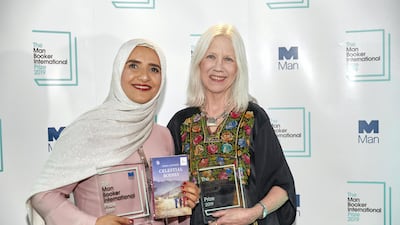Acclaimed Omani author Jokha Alharthi says it would be torture if she had to write in a different language than Arabic.
In her first interview since winning the coveted Man Booker International Prize, Alharthi spoke of her love for her homeland and its language.
At an exclusive event at London Piccadilly's Waterstones bookstore, the author read extracts from her winning novel Celestial Bodies in English and her native tongue, before taking questions from the audience.
On Tuesday she became the first Arab to win the prize, and is only the sixth to have ever been nominated.
She will share the £50,000 (Dh233,465) award for her novel with the book’s translator, American academic Marilyn Booth.
“Arabic is my passion, it’s homeland," Al Harthi told the crowded session on Thursday.
"In a way it’s great for an author to love her language but at the same time it creates difficulties in other languages that I try to learn, because in Arabic we always want to be perfect and very precise.
“It’s torturing in a way if you are really in love with a language. And it’s beauty.”
She told the room she struggled to learn English later in life.
“I didn’t listen much in school [to English classes] then in 2005 in Edinburgh I had to write a PhD in English and it was very difficult,” Alharthi said. “I do not think I would write in another language.”
Celestial Bodies, which is set in the Omani village of Al Awafi and deals with the lives and loves of three sisters, is the first novel written in Arabic to win the award.
The London event was chaired by award-winning writer and human rights activist, academic and former Man Booker International Prize judge Elif Shafak.
“You are the first female Arab author that has got this prize and you come from a family of strong women," Shafak said. "Your aunt climbed Mount Everest yesterday.
“Clearly a family of strong women and I salute that.”
Alharthi, 41, is the first Omani author to have a novel translated into English. Now another of her novels, Bitter Orange, is being translated.
Her winning novel was originally published in 2010 and was her second book.
She came up with the idea for Celestial Bodies while studying for a PhD in classical Arabic literature at Edinburgh University, when she felt homesick and took to writing about people in Oman.
Alharthi published her debut book Manamat (Dreams) in 2004 and her third, Narinjah (Bitter Orange), in 2016.
She told the crowd that she is now working on a fourth novel.
Alharthi is also teaching at the Sultan Qaboos University in Muscat.


